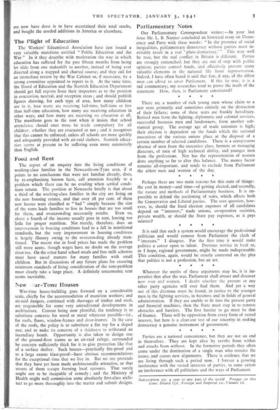Food and Rent
The report of an enquiry into the living conditions of working-class families in the Newcastle-on-Tyne area, if it points to no conclusions that were not familiar already, does, by re-emphasising known facts, call attention forcibly to a problem which there can be no evading when settled condi- tions return. The position at Newcastle briefly is that about a third of the working-class families in the city are living on the new housing estates, and that over 28 per cent. of these new homes were classified as " bad " simply because the size of the rents leads families to live in houses that are too small for them, and overcrowding necessarily results. Even so, about a fourth of the income usually goes in rent, leaving too little for proper nutrition. Not merely, therefore, does an improvement in housing conditions lead to a fall in nutritional standards, but the very improvement in housing conditions is largely illusory owing to the overcrowding already men- tioned. The recent rise in food prices has made the problem still more acute, though wages have no doubt on the average risen too. On the other hand school meals and free milk schemes must have eased matters for many families with small children. But in discussions of any future plans for ensuring minimum standards of living consideration of the rent-problem must clearly take a large place. A definitely uneconomic rent seems inevitable.






























 Previous page
Previous page